#meta textual
Explore tagged Tumblr posts
Text
I feel really bad for Nadia in this scene. Learning that your heroes are not infallible is always rough! Plus, Jeremy Whitley brilliantly lays the groundwork for Nadia’s later bout with bipolar disorder, and Janet’s words here are so powerful!
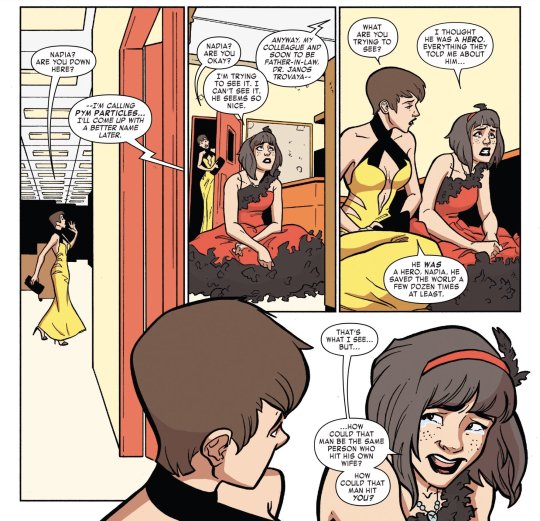
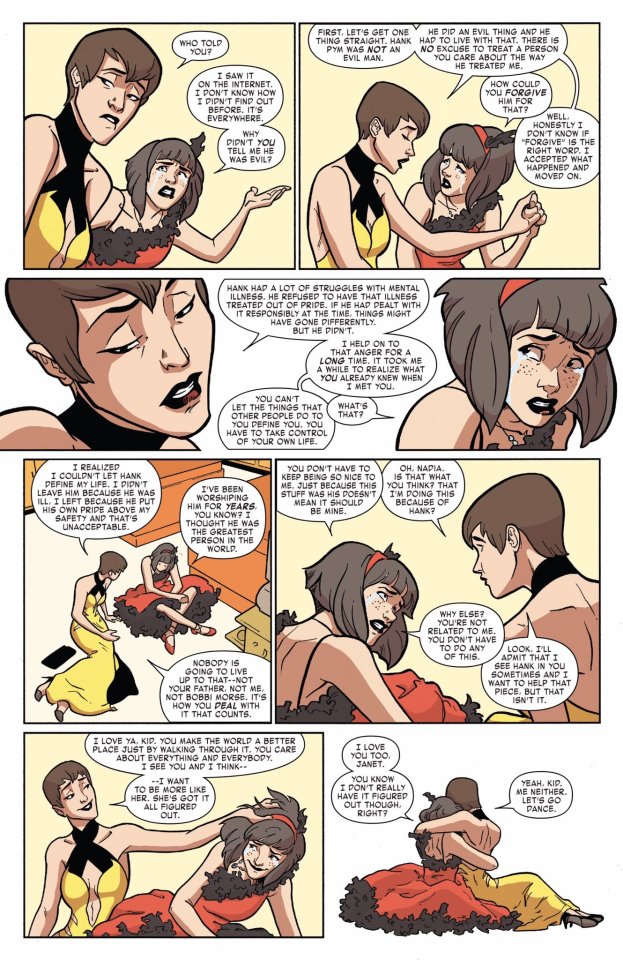
Also, I love the meta-commentary of how Nadia confirmed the truth about the time Hank Pym struck Janet via the Internet, since in real-life the Internet is primarily where Hank’s infamous reputation is the most talked about.
From The Unstoppable Wasp (2017) #8 by Jeremy Whitley, Ro Stein & Ted Brandt.
#unstoppable wasp#nadia van dyne#janet van dyne#wasp#hank pym#agent of g.i.r.l.#meta textual#jeremy whitley#ro stein#ted brandt#marvel comics
91 notes
·
View notes
Text
Hey y'all! Since it's Love Loses Wednesday for all who celebrate and I have plenty of thoughts about it, here's some of those thoughts I've had for my fellow enjoyers of Chip Bastard from the insanely powerful podcast Just Roll With It!
So.
Chip being so focused on family and friends, on finding Arlin and keeping his co-captains and crew safe, while the most he ever shows interest in romance is in brief, jokey flirting that's quickly brushed aside.
Chip buying a love potion, only for it to sit unused in his inventory for literal months until it unceremoniously drops into the mouth of the Electrodon.
Chip being unnerved or even downright scared when somebody shows a sign of being attracted to him (Amanda with the marriage, Jazz and his flirting, the frantic denial to Ollie that Gillion kissing him meant anything (which was then followed by barely any change in their relationship. A typically romantic act, done as an act of love between friends, and yet those friends never did start a romance. Curious))
Speaking of Amanda and the marriage: Chip waking up one day and suddenly being expected, even morally obligated, to be in a romantic relationship with somebody he doesn't even know, for reasons he doesn't even know. And even when he clarifies that he doesn't want this, that he won't give up being a pirate with his friends for it, he still can't leave behind the expectation fully, because Amanda, and thus this expectation, is literally chasing him. Sometimes it even comes from his own friends, because no matter how much he would prefer to just Not Be Married, there's no way for him to get out of it, especially not ones Gillion would likely accept, and therefore the expectation that eventually, he'll be in a romance, is inescapable.
And even more interesting, he's not opposed to the idea of getting married in general. He wasn't wholly against the notion of marrying Igneous just for the AC boost it would give them. Clearly, the problem he had wasn't with the marriage itself, but with the fact that he was expected to form a romantic partnership.
And lastly: Chip having his literal heart ripped out of him, and staying nearly the same. Making jokes about how his heart was stolen in a way that was literal instead of romantic. Writing to his wife that if death do them part, then now it has (and doesn't it even say something that the only way for him to escape the marriage, the expectations, was to die?)
He cares for his friends just the same. He cares for his crew just the same. He wants to find Arlin just as much as ever. And his avoidance of his wife, of the expectation that he perform romance, stays the same. But even if he's the exact same, he has an excuse for this now. Because clearly, somebody with no heart couldn't feel romance, and who cares that he didn't really seem to before he lost his heart either?
Chip being aromantic, on a textual, metaphorical, and thematic level.
#rem's ramblings#just roll with it riptide#jrwi riptide#chip bastard#chip jrwi#jrwi chip#riptide meta#riptide analysis#aromantic chip#aromantic headcanons#aromantic#amanda as a metaphor for amatonormativity in particular is So important to me#anyways yeah this is half textual evidence and half metaphors but Analysis Fun and either way. chip aromantic. i'm claiming him
1K notes
·
View notes
Text
A little hopeful moment which I missed on the first watch, but which I think is so important. Nina and Maggie come to have their talk with Crowley. Now, we all know that Crowley is Maggie—yes, sure, Nina is sarcastic and suave and cool and calls Maggie angel—but it’s obvious that Crowley is Maggie and Nina is Aziraphale. Crowley even admits it himself in the very beginning of this conversation when he tries to justify meddling to get Maggie and Nina together:
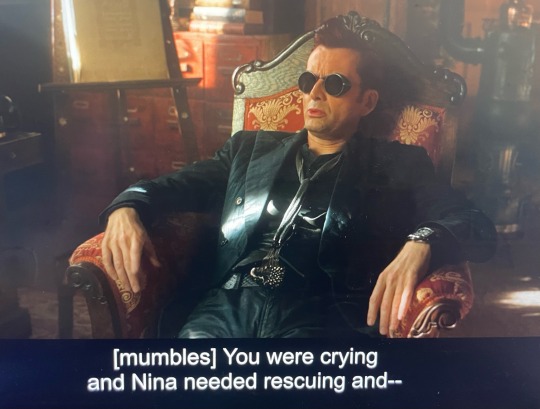
“Nina needed rescuing.” Yeah, you know who else always “needs rescuing”? Anyway, moving on.
Nina says she just got out of a relationship and it would be a disaster to get into another one right away. And then this happens:
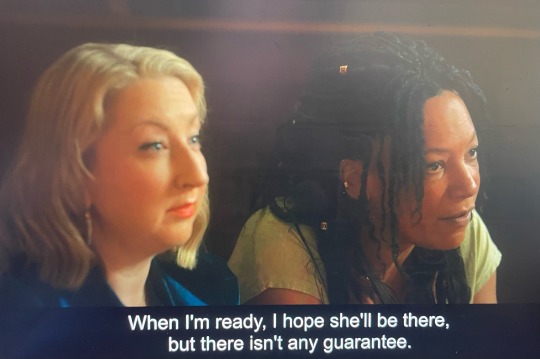
Nina says she hopes Maggie will still be around, but she knows she can’t ask Maggie to just wait while she figures out her own baggage. There's no guarantee. And then Maggie interjects—
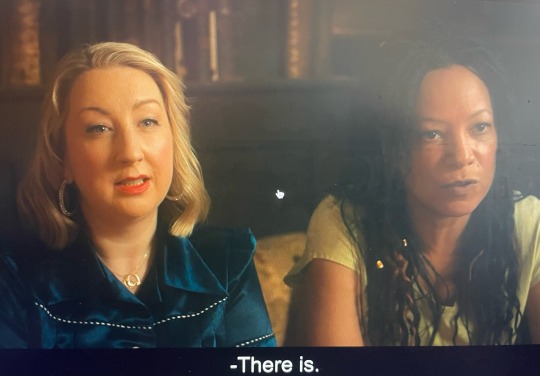
The parallel between Maggie/Nina and Crowley/Aziraphale is so intentional as to feel heavy handed. So what does it mean that we get this exchange in at this particular moment in the script—buried within the conversation which is the catalyst for Crowley confessing his feelings, occurring in the lull immediately before the spectacular dissolution of everything the first two seasons were building towards?
“We could have been us,” Crowley says. Crowley walks out of the bookshop. Crowley turns off their song in his car. Whatever tentative blooming thing has been building between him and Aziraphale for six thousand years appears to be very clearly over. Aziraphale presses the kiss to his lips and knows there is no guarantee they will ever have a chance to be together. There's no guarantee that Crowley will ever want to forgive him, that he will keep on waiting for him.
But.
There is.
#good omens#good omens meta#gos2 meta#gos2 spoilers#reaching for crumbs to tide me over in lieu of a promise of s3#in this case the crumbs are pretty textual though#Neil Gaiman never did meet an instance of parallelism he could resist#I have hope#but Aziraphale is going to have to figure out who he is first#away from Crowley#away from heaven#and he’s going to have to work on himself until he is ready#for the gift of Crowley’s love#ineffable husbands#forgive my super crappy screenshots I don’t have a download of the show#yet
3K notes
·
View notes
Text

Gotham City was host to one of the first radio game shows, if not in the world, then certainly in the country. “The Riddle” was a staple part of many household schedules. But its beloved host, Madeline “Maddi” Wagner has been… missing for months now.
Some citizens of Gotham report that “The Riddle” still sometimes broadcasts at its usual time. Those who claim to hear it consistently describe: being given strange riddles about the history of various places, mostly in Gotham City. They also report that the host calls himself “Edward Nigma” and sounds something like “Maddi.” These reports have never been substantiated due to the often… unreliable nature of these witnesses. Gotham Police have deemed all known listeners either delusional or have lost contact with them all together.
Dig too deep or get profoundly unlucky.
#idk I was just disappointed by how surface level the horror of The Doom that Came to Gotham was#plus wanted to explore a Riddler concept that was more… meta textual?#this is the most physical Eddie will every be#instead usually ‘appearing’ through their charismatic speech bubbles heard over the radio#the threat is never an outright death trap#instead they torment Bruce through offering puzzles that can almost only be solved by the readers#literal knowledge beyond his comprehension and outside his perception#my art#edward nigma#the riddler#my ocs
211 notes
·
View notes
Note
🔥worm
I understand and agree with the common criticisms of Skidmark's portrayal vis a vis the ugly portrayal of black people and drug users, but nonetheless I'm fond of the character on a number of levels. He's significantly smarter and more competent than he's given credit for within the narrative or within the fandom at large- from the logic underpinning the demeaning naming conventions of his crew, to the fact that he's one of the only on-screen characters to successfully engineer a trigger event, to the untold story behind how he acquired his Cauldron vials and his knowledge of their potential pitfalls. He holds his own against Faultline in a fun way. He gets some really funny lines. His power- and it's use for the trigger arena in arc 11- is the crab-bucket mentality made literal. Thematically I rarely see anyone point out the ways in which he fits into the observed schema of how all of Taylor's enemies are foils to her in some way- he's the only one of her antagonists who's also trying to tap into the power of the masses, a dark mirror to her strongwoman cult-of-personality tactics at a point in the story where the one-bad-day logic governing superpowers and supervillainy has been applied to the entire population of the city. Obviously, the entire package is fatally dragged down in the previously litigated ways by the 1980s-PSA-level of narrative hostility towards drug users and dealers, his status as the butt of every joke, and the ultimate fate of his entire team being unceremoniously exterminated in a sequence that borders on slapstick so that Slaughterhouse Nine can receive a slight credibility bump before they start taking dive after dive. But there's nonetheless some there there. There should have been a merchants interlude
#thoughts#meta#worm#wormblr#parahumans#Bottom line I think he's textually smarter than authorial commentary would suggest#ask#asks#ask game#effortpost
173 notes
·
View notes
Text
“I like who I am now! Probably more than who I was. But that doesn’t mean he was bad.”
This line chokes me up. The distance of calling your past self with a third person pronoun, marking how far you’ve come, the progress of healing simultaneously making the past seem foreign, distant. And yet at the same time there’s this unending grace for that past self, giving mercy to a younger you for being hurting and scared and lashing out. Looking back having grown so much it can be easy to loath that distant, other you. But instead you show that past you kindness he because he wasn’t given kindness then, either.
Giving mercy to something imperfect and aching just feels so right for the end of the dsmp. We can’t go back. But we can miss it, and forgive.
#That ending is so good both in story and meta textually#Dsmp#dream smp#jack manifold#oh Jack manifold thank you#cjack manifold#ctommy#tommyinnit#sbi#mcyt#something to nom on#Y’all cannot be sleeping in this line
189 notes
·
View notes
Text
fanonwise i sometimes feel that we don’t treat barty crouch jr’s relationship to his father with the amount of nuance that it’s given in canon.
i see more evidence for their dynamic as one of a prodigal son‘s unexpected betrayal, rather than him being openly defiant from the beginning. barty jr disdains his father more than he fears him.
barty’s character is more about being Stifled than it is about being Penalized, if that makes sense. he is a docile thing on the outside. for a counterexample: sirius continuously rebelled against his parents and was punished for it, over and over. barty is more the case of a child dutifully abiding with something spiteful and ugly growing underneath his surface, larger each passing year.
barty’s revenge, and his anger, and his suffering, are all quiet things: the secret burying of a bone, the forced muteness of imperius. barty doesn’t react when he speaks about his father or sees him in disguise. he admits to never truly considering him a father, seeing more of himself in tom instead.
this is more compelling to me than casting him as a sirius-variant!! it’s a slow type of resentment— leading to torture and ending in revenge— and i like the idea of barty as someone in Waiting. he’s the deferential mirror of a man he doesn’t respect (but never truly, not inside). barty jr was a son raised to take the place of his father: obeying to the letter until he suddenly didn’t, and finally usurping him in the most violent way possible with patricide. his father wanted an heir to replace him and he created a perfect one, in the most tragically ironic way possible!! this will always be more interesting to me than a barty who is plainly defiant from the outset— it flattens him!!
#there’s textual evidence for all of this but i’m too lazy to pull quotes right now. BUT KNOW THEY ARE THERE AND I HAVE THEM IN MIND#this applies to modern/noncanon aus too. barty was the perfect son who dramatically blew his life up & randomly moved out at 17#& showed up covered in tattoos and piercings & half the people who knew him can’t believe it. reg isn’t surprised in the least though#barty meta tag#saints speaks 🐇
211 notes
·
View notes
Text
Will first slowly leaves the frame during Mike's speech when he says he isn't scared of El. Because this is what Mike wanted to tell her. "The problem wasn't you". That's the truth he needed her to know regardless of his fear. He then says that he's afraid of her leaving him. We know this to be true because he said it when she wasn't there. He tells her he doesn't know to live without her. Sweet, and no reason not to be true.

But once we get to the story. The "my life started" story. Will inches back onscreen...
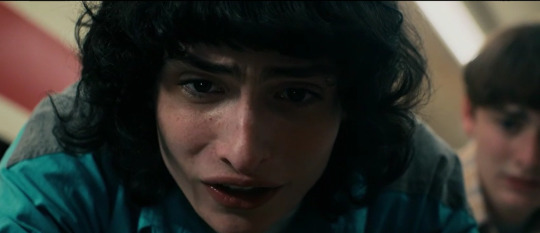
Which is odd. It isn't even a change back. Because when he says that he loves her again, Will is once again gone. So it was just for this shot.
Then we return for "I love you on your good days, I love you on your bad days, I love you with your powers, I love you without your powers. I love you for exactly who you are."
But would you look at who's onscreen for the immediately following line "you're my superhero"

They put a one second shot between these to transition it. Not even a reaction shot from El. It's the shot of their hands. And this is only shot Will is in here. It goes straight back after this single sentence.
Will slowly leaves the shot for "I can't lose you" and stays out for the rest of his speech until the final "fight!"

This isn't so much a lie as it is a joint truth. This is not a romantic sentiment. It is showing the entire motivation of Will encouraging Mike in the first place - they are doing this together because they both want to save El in the same way. This is an agreed upon action with an agreed upon goal - one being stated here: "fight".
So what does this tell us about truths:
I love you. Do you hear me? I love you. I'm sorry I don't say it more. It's not because I'm scared of you. I'm not. I've never felt that way. But I am scared that one day, you'll realize you don't need me anymore. And I thought that if I said how I felt, it would somehow make that day hurt more. But the truth is, El, I don't know how to live without you. I feel like my life started that day we found you in the woods, and you were wearing that Benny's Burgers' t-shirt. And it was so big it almost swallowed you whole. And I knew, right then and there, in that moment that I loved you. And I've loved you every day since. I love you on your good days, I love you on your bad days. I love you with your powers, I love you without your powers. I love you for exactly who you are. You're my superhero. And I can't lose you. Do you hear me? I can't lose you. You can do anything. You can fly. You can move mountains. I believe that. But right now, you just have to fight. You have to fight. Fight. Fight!
Everything remaining is Mike's truth and only Mike's truth. He is sorry. He isn't scared of her. He's scared of losing her. He loves her regardless of her powers. He believes in her. He wants her to fight. That is the truth. That first "I love you" is different and he knows it. So even though he repeats the words, that time, it's a lie.
I also note the sentence "said how I felt". Because that's what makes it true. It would not be true if he said "if I told you I loved you". He said "if I said how I felt". And with that, let's put this in a true context. Let's use these truthful lines in the context he wanted to use them in. Let's set the scene:

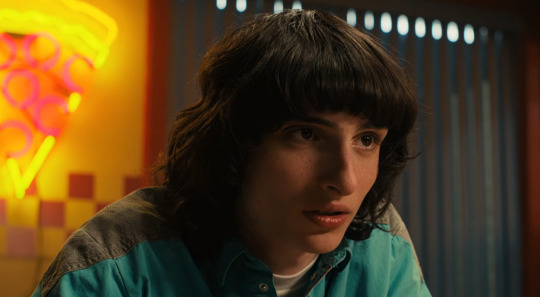
The last few days, I've had to think about the last talk we had. You know, before the cops and the whole world went to shit and everything. I guess I just, I don't know, I guess I just wanted to say I'm sorry I don't say it more. It's not because I'm scared of you. I'm not. I've never felt that way. I just can't love you the way you want to be loved, but that doesn't mean that I don't. But I'm scared that one day, you'll realize you don't need me anymore. And I thought that if I said how I felt, it would somehow make that day hurt more. But the truth is, El, I don't know how to live without you. I do love you. Every day. I love you on your good days, I love you on your bad days. I love you with your powers, I love you without your powers. I love you for exactly who you are. And I can't lose you. I can't lose you.
I added one line. One line only that changes "won't need me anymore" from a reason to an elaboration. Everything else is the same. Everything else did not need to be changed to fit the other narrative.
As I said recently...something should have contradicted at some point. It didn't.
The consistency of which is truth and not is also supported by what's used when he's begging her to wake up.
Subtle but not total inclusion of Will, who also wants her to wake up, but with focus still on Mike for "come on, come on" (with even a cut back to him)
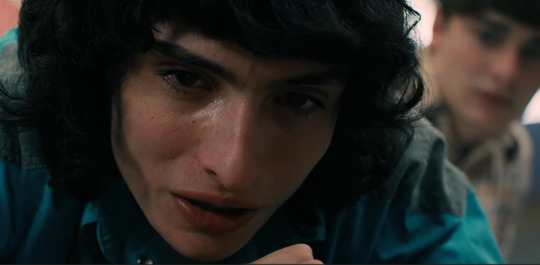
But when it cuts back to him on the 'I' statement "I know you're in there, Will has been addressed in reaction and is now out of the shot.

Mike and Will in the shot is about both of them, proven by the reaction shot of Will that follows; just Mike is only him, proven by the shift and timing with the "I" statement.
These are also, of course, different enough angles that the camera requires adjustment to capture, so it was important to them, as it also not enough difference to have been more than one camera.
#elmike cinematography#byler cinematography#the ily speech#stranger things#willelmike cinematography#willelmike meta#the pizza scene#pizza scene#elmike breakup#platonic elmike#elmike speculations#elmike textual analysis#textual analysis
65 notes
·
View notes
Text
Repayment but Not Just Repayment or a Meta on the Wen Siblings' Sacrifice
Wen Qing and Wen Ning's sacrifice is probably one of the most under-discussed topics in the fandom. A few have tackled it from the viewpoint of debt—which is true and valid—but I will be coming at it from the angle of love, because although there is a debt that ties Wei Wuxian to the Wen siblings, it is inseparable from the genuine affection they each hold for him. Let's start with Wen Qing's last words to Wei Wuxian:
Wen Qing interrupted him, “I’ve never really said such things to you before. But now that it’s today, there are indeed a few things I should say. I really won’t get a chance to say them after this.” ... Wen Qing, “I’m sorry. And, thank you.”
—Chapt. 77: Nightfall, exr
Throughout the novel, characters seem to have a negative response to being told "I'm sorry" and "thank you" in serious conversation, as both seem to imply a tie of debt and accepting ownership of the debt. Jin Ling refuses to thank Wei Wuxian for saving his life or apologize to him for being disrespectful despite all the life-saving. Lan Wangji has a negative reaction to Wei Wuxian thanking him in many different scenes in the novel, so much so that Wei Wuxian comments on the fact that a lot of their bad separations were precipitated by Wei Wuxian's thanks. Even here, Wei Wuxian has a negative reaction to Wen Qing's words, especially as they come at the end of her speech about how the repayment she asked of Wei Wuxian has unintentionally led them all down a path of no-return. But Wen Qing isn't using it in this way.
As discussed here and here, the Wen siblings actually love Wei Wuxian outside of the circumstances they find themselves in. They do not tie themselves to him because of debt but because he has proven himself to be honest and genuine in a way that the other cultivators they had previously come up against had not. At the same time because of the debt, the relationship between the three is fraught with things that cannot be said lest they be misunderstood. Wen Qing never verbally thanks Wei Wuxian for bringing her brother's consciousness back; instead she treats his wounds and helps put together a family banquet in his honor where she even personally serves him food and alcohol. Wen Ning never verbally thanks Wei Wuxian for rescuing his family and bringing him back; instead he continues to act as his physical protector in both of Wei Wuxian's lives. Neither of them apologize for having implicated Wei Wuxian in the plight of the Wen remnants, as that would have been incurring another debt that Wei Wuxian would likely not accept. However, when the tentative stalemate with the cultivation world is broken with Jin Zixuan's death, none of that matters anymore. They are all at the end of the line and must make a choice: throw Wei Wuxian to the wolves or sacrifice themselves. They choose to sacrifice themselves in the hopes that it will spare Wei Wuxian:
Wen Qing’s voice was calm, “Wei Ying, we both know. Wen Ning is a knife, a knife that scares them, but also a knife that they use as an excuse to attack you. If we go, without the knife, they’d no longer have an excuse. This entire thing might finally be over.”
They can finally say what they want to say, which is that they appreciate what Wei Wuxian has done for them, that they see all that he has sacrificed, that they are willing to match that level of dedication, and that they, too, are willing to risk themselves to protect him as he had been doing for them for up to a year, now. For once, the "thank you" and "I'm sorry" isn't meant to emphasize a debt-repayment relationship. It is meant to liberate Wei Wuxian from them.
#xiantober#mdzs#human metas mxtx#happy bday wwx from your yiling siblings ☀️#now i will say once again that i do not know mandarin#and i am not the most familiar with chinese culture#there seems to be an actual cultural elements to thanks and apologies that i am missing#so i am only tackling this from the textual standpoint#rather than the outside cultural-historical one#me two days ago: wen qing has no pet names for wwx#me rereading the sacrifice: she calls him wei ying 😭😭😭
76 notes
·
View notes
Text
sometimes. what i like to read or write in fic or just generally play around with.... is different and, dare i say, sometimes even contradicting to what i think the canonical reading is offering. like yeah he would not fucking say that but every once in a while i do like to indulge. sue me
#*mine#mona rambles#people do be taking things so seriously these days like#sometimes i just wanna see a silly lil oneshot where the blorbo du jour Fucks Shit Up and go#idk where this weird idea comes from to assume everything i ever write down in a fic or in some rambly headcanon post is like#equivalent to saying 'i think this is what the text says' like???#the text says they had wives and are straight and don't fuck their brothers too like. come on now#and i don't mean this in a dismissal of/disdain for canon sort of way either#i hate the whole 'fuck canon i know better' attitude that's not what i'm talking about#i mean this more in a. not every oneshot i write is a 'this is a meta-analysis of textual realities'#and more a 'okay this absolutely isn't canon but what if it WERE#let's explore'#sometimes you just gotta pat canon on the head tell it i love you and i know this isn't you but I'm going to anyway <3#peace and love. etc etc#god i know people will so wildly misinterpret this as a 'she doesn't even care about canon then what is even the point 🙄'#or a 'YEAH FUCK CANON I KNOW BETTER 😤' kind of way i'm already tired#to the three people who'll get it ily tho <3#i do think the crux is the awareness yk. like. knowing deviation or smthg. anyway#bisexuality. love wins <3
66 notes
·
View notes
Text
This classic panel of Peter’s dreaded “Parker Luck” breaking the 4th wall lives rent free in my head to this very day!

From Amazing Spider-Man (1962) #15 by Stan Lee & Steve Ditko.
#spider man#peter parker#parker luck#meta textual#4th wall break#silver age comics#stan lee#steve ditko#marvel comics
3 notes
·
View notes
Text
analysing haikaveh's body language and distance in a parade of providence compared to cyno's story quest 2
in Cyno’s Story Quest II Kaveh seems secure in his position as Alhaitham's equal, and as such, Alhaitham is regarded as Kaveh's equal in turn. There is no reference to the superiority of a senior's expertise as “correctness” has been disregarded, and with this, the unequal power imbalance (as discussed here). The two have surpassed this issue on their road to reconciliation. The lack of titles within this story quest serves as a means of equality between the two now that scholarly pride is no longer an obstacle between them.
As such it is interesting to (over)analyse Haikaveh’s body language and distance within A Parade of Providence and in Cyno’s story quest 2
They are the most distant within A Parade of Providence, in which the two are always separated by a physical barrier, such as a desk:

or standing at a distance from one another and on opposite sides, preventing them from facing each other directly:
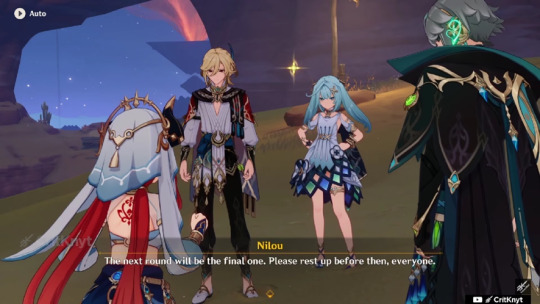
or with Alhaitham being elevated upon a platform, whilst kaveh is on the ground below:

Within the event, the only time the two are physically on an even level is at the end, in which Alhaitham tells Kaveh that they have move past being “wrong” or “right”. In this, the only time in which they are physically open with each other, and on equal elevation levels, is when the potentiality for the overturning of scholarly pride is discussed, and therefore there exists the potential of a true, mutual understanding.

Comparatively, in the flashback scene within cyno’s story quest 2, Kaveh is observed on two occasions to sit on the table rather than opposite or next to Alhaitham on a divan. This ensures that the two directly face each other:

This can be seen again in the House of Daena, where, when studying, the two sit on opposite sides of the table, facing each other, as they are of equal standing:

In terms of equality, this can be speculated as physical manifestation of their aligned perspectives. Rather than one existing on an elevated level, through one sitting and the other standing, or directly sitting next to each other (which can restrict the observation of the others’ gestures and body language), the two are now on equal standing.
The only time the two are shown sitting next to each other is in Puspa’s Café, but rather than this being an indicator of inequality, it serves as a reinforcement of mutual intimacy, as the two are paired together rather than being separated in the large gathering


In this sense, this equality in elevation levels can also physically advocate for the open communication the two have now established. This can be seen in their current in game relationship as the two now fully physically reveal themselves, alongside their thoughts, to the other, rather than concealing themselves with defensive body language, and double entendre in speech. They are now open and honest with each other - mutually equals in all respect!!
(This analysis snippet is from my Haikaveh queercoding essay found here!)
#haikaveh#kavetham#alhaitham#kaveh#genshin impact#cyno story quest#haikaveh meta#i was reminded of the alhaitham camera angle post when doing this#this was v fun to analyse because i truly was screaming that alhaitham and kaveh never directly faced each other#in a parade of providence#the only times they could have done is when we dont get to see it?? like after the second round#and alhaitham is tweaking at kaveh in their house#and also when alhaitham misses the dinner in apop we never get to see where he would have sat#so basically its honeymoon period in haikaveh nation i think#in other news!! i have finally had time to play genshin and will soon play the odd textual mystery so i can yap about that#for those who are interested in my thoughts(???) sorry its taken me so long!!!
128 notes
·
View notes
Text
there was some Twitter madness recently where someone left a comment on someone's art to the effect of, "Ed shouldn't wear a dress, he's a man!" which I do disagree with on principle, but unfortunately, it brought out one of my least favourite trends in the fandom
so, naturally, I had to write a twitter essay about it. and I already largely argued this in a post here, but the thread is clearer and better structured, so I thought I'd cross-post for those not on the Hellsite (derogatory). edited for formatting/structure's sake, since I no longer have to keep to tweet lengths, and incorporating a couple of points other people brought up in the replies
so
I want to point out that the wedding cake toppers in OFMD s2 aren't evidence that Ed wants to wear dresses. Gender is fake, men can wear skirts, play with these dolls how you like, but it's not canon, and that scene especially Doesn't Mean That.
People cite it often: 'He put himself in a dress by painting the bride as himself! It's what he wants!' But that fundamentally misunderstands the scene, and the series' framing of weddings as a whole. I'd argue that Ed paints the figure not from desire, but from self-hatred; it's not what he wants, but what he thinks he should, and has failed to, be.
(Yes, I am slightly biased by my rampant anti-marriage opinions, but bear with me here, because it is relevant to the interpretation of the scene, and season two as a whole.)
The show is not subtle. It keeps telling us that the institution of marriage is a prison that suffocates everyone involved. Ed's parents' cycle of abuse is passed to their son in both the violence he witnesses then enacts on his father, and the self-repression his mother teaches, despite her good intentions ("It's not up to us, is it? It's up to God. ... We're just not those kind of people. We never will be."). Stede and Mary are both oppressed by their arranged marriage, with 1x04 blunty titled Discomfort in a Married State. The Barbados widows revel in their freedom ("We're alive. They're dead. Now is your time").
But even without this context, the particular wedding crashed in 2x01 is COMICALLY evil. The scene is introduced with this speech from the priest:
"The natural condition of humanity is base and vile. It is the obligation of people of standing ... to elevate the common human rabble through the sacred transaction of matrimony."
It's upper class, all-white, and religiously sanctioned. "Vile natural conditions" include queerness, sexual freedom, and family structures outside the cisheteropatriarchal capitalist unit. "The obligation of people of standing" invokes ideas like the white man's burden, innate class hierarchy, religious missions, and conversion therapy. Matrimony is presented as both "sacred" (endorsed by the ruling religious body), and a "transaction" (business performed to transfer property and people-as-property, regardless of their desires), a tool of the oppressive society that pirates escape and destroy. That is where the figurines come from.
When Ed, in a drunk, depressive spiral, paints himself onto the bride, he's not yearning for a pretty dress. He's sort of yearning for a wedding, but that's not framed as positive. What he's doing is projecting himself into an 'ideal' image of marriage because he believes that: a) that's what Stede (and everyone) wants; b) he can never live up to that ideal because he's unlovable and broken (brown, queer, lower-class, violent, abused, etc); c) that's why Stede left. He tries to make himself fit into the social ideal by painting himself onto the closest match - long-haired, partner to Stede/groom, but a demure, white woman, a frozen, porcelain miniature - because, if he could just shrink himself down and squeeze into that box, maybe Stede would love him and he'd live happily ever after. But he can't. So he won't.
The fantasy fails: Ed is morose, turns away from the figurines, then tips them into the sea, a lost cause. He knows he won't ever fulfil that bride's role, but he sees that as a failure in himself, not the role. It's not just that "Stede left, so Ed will never have a dream wedding and might as well die." Stede left when Ed was honest and vulnerable, "proving" what his trauma and depression tell him: there's one image of love (of personhood), and he'll never live up to it because he's fundamentally deficient. So he might as well die.
This hit me from my very first viewing. The scene is devastating, because Ed is wrong, and we know it! He doesn't need to change or reduce himself to fit an image and be accepted (as, eg, Izzy demanded). Stede knows and loves him exactly as he is; it's the main thread and theme of season two!
(@/everyonegetcake suggested that Ed's yearning in these scenes includes his broader desire for the vulnerability and safety Stede offered, literalised through unattainable "fine" things like the status of gentleman in s1, or the figurine's blue dress. I'd argue, though, that these scenes don't incorporate this beyond a general knowledge of Ed's character. Ed is always pining for both literal and emotional softness, but the significance of the figurines specifically, to both Ed and the audience, is poisoned by their origin and context: there is no positive fantasy in the bride figure, only Ed's perceived deficiency.
Further, assuming that a desire for vulnerability necessarily corresponds with an explicit desire for femininity, dresses, etc, kind of contradicts the major themes of the show. OFMD asserts that there is nothing wrong with men assuming femininity (through drag, self-care, nurturing, emotional vulnerability, etc), but also that many of these traits are, in fact, genderless, and should be available to men without affecting their perceived or actual masculinity. It thematically invokes the potential for cross-gender expression in Ed's desires, especially through the transgender echoes in his relieved disposal, then comfortable reincorporation, of the Blackbeard leathers/identity. It's a rich, valuable area of analysis and exploration. But it remains a suggestion, not a canon or on-screen trait.)
Importantly, the groom figure doesn't fit Stede, either. Not just in dress: it's stiff and formal, and marriage nearly killed him. He's shabbier now, yes, but also shedding his privilege and property, embracing his queerness, and trying to take responsibility for his community. In a s1 flashback, Stede hesitantly says, "I thought that, when I did marry, it could be for love," but he would never find love in marriage. Not just because he's gay, but because marriage in OFMD is an oppressive, transactional institution that precludes love altogether. All formal marriages in OFMD are loveless.
So, he becomes a pirate, where they reject society altogether and have matelotages instead. Lucius and Pete's "mateys" ceremony is shot and framed not like a wedding, but as an honest, personal bond, willingly conducted in community (in a circle; no presiding authority, procession, or transaction).
That is how Stede and Ed can find love, companionship, and happiness: by rejecting those figurines and their oppressive exchange of property, overseen by a church that enables colonialism and abuse. Ed is loved, and deserves happiness, as he is, no paint or projection required.
ALL OF THIS IS TO SAY: draw Ed in dresses! Write him getting gender euphoria in skirts! Write trans/nb Ed, draw men being feminine! Gender is fake, the show invites exploration, that's what 'transformative works' means! But please, stop citing the cake toppers as evidence it's canon. Stop citing a scene where a depressed Māori man gets drunk and projects himself onto a rich, white, silent bride because he thinks he's innately unlovable and only people like her can find happiness, shortly before deciding to kill himself, as canon evidence it's what he wants.
(Also, please don't come in here with "lmao we're just having fun," I know, I get it. Unfortunately, I'm an academiapilled researchmaxxer, and some of youse need to remember that the word "canon" has meaning. NOW GO HAVE FUN PUTTING THAT MAN IN A PRETTY DRESS!! 💖💖)
#OFMD#Our Flag Means Death#OFMD Edward Teach#gender stuff#Togas does meta#god this seems even longer as a semi-proper essay XD#I know this is the piss on the poor website of reading comprehension but please god don't misunderstand me#i'm not saying you can't draw ed (or any other male character!) in a dress or that it's The Wrong Interpretation or whatever#I AM saying this fandom sometimes emphasises feminising Ed to the point of over-simplification and dehumanisation#which certainly feels at least racist-adjacent and definitely misses the point of the show#but mostly I'm saying that THAT SCENE DOESN'T MEAN THAT and I wish people would stop talking about it like something sweet and positive#when it's one of the most miserable and heartbreaking scenes in the show. like. agreeing with ed's depression is a bad look...#my experience of trying to do meta in the last year or so has consisted almost entirely of trying to do#specific historicist analysis or textual close readings#and being met with broad political analyses and overall interpretations of character#like mate..... bless you for engaging but. that is not what I'm doing here. XD#shoutout to the couple folks on twt that mentioned Ed's desires generally or an outtake from the scene#neither of which are at all relevant to my point but thank you for your input
117 notes
·
View notes
Text
It is so interesting to me how little effort Orlok puts into murdering Thomas given his marriage to Ellen is what moves him to interfere more directly with Ellen’s life in the first place.
I know on a doylist level it matches the 1922 version which is based heavily in Dracula (where Dracula just genuinely wants London property to take over England and fucking with the real estate agent is a bonus). But that still leaves watsonian perspective to fill.
Like if he just killed him the marriage contract wouldn’t have been needed. Legally and spiritually speaking (at least in this stories character’s Christian background) it’s fine to get re-married after the death of a spouse. Orlok wasn’t dependent on him being alive to manipulate Ellen because he seems to be surprised, though not concerned, that Thomas survived the wolves.
Maybe he wanted the contract signed to manipulate Ellen with or for gloating reasons, but then immediately after it’s signed he still doesn’t kill him, he’s just like “stay here you can’t travel if you’re sick”and then goes to sleep.
He can control Thomas’s actions to make him unlock a door but simply plucks the pick axe he tried to kill him with out of his hands like you would a kid holding a knife, and then lets him make a run for it. He drains his blood but not to the point he’s so debilitated he can’t jump into a creek (or even to the point where he’s dead!!! It’d be so easy!!!) he leaves him to the pissed off wolves and assumes that killed him but doesn’t check for sure.
Also all this occurs after Orlok is figured out, so like what was his plan if Thomas didn’t interrupt his slumber? Keep him in his evil castle as a midnight snack forever? Let him head back home after marrying his wife?
Then we see that Orlok generally rips people’s throat out to drink their blood instead or gives them literal plague instead of the chest method he does for exactly two people, his supernatural covenant obsession, and Thomas (for some reason??? I get he’s cute but isn’t that the guy who you see as the mistress???). Also given this development it would have been really easy to kill him the entire time and Orlok just chooses not to.
Then he’s surprised to discover he’s alive but won’t let Knock try to kill him or bring him to Orlok to kill him. He does threaten his life to get to Ellen but that’s like the first time in this movie direct murder is on the table.
Anyway this is one of the weirdest responses to a perceived love rivalry in film history. I need to shake him around in a jar.
#nosferatu 2024#nosferatu#i like to interpret it as him switching from murder to torment after seeing how gnawable he is#but that’s not like#textual#thomas hutter#count orlok#nosferatu meta
23 notes
·
View notes
Text
tex red vs blue is insanely transgender but im the only one who sees it that way because im crazy in the head.
what if there was a past version of yourself. a woman, a wife, a mother, with long hair and a sweet smile. and she died long ago. and you are her. but you are not her. you're nothing like her, but the people who knew her desperately want you to be her, want to preserve the memory they have in their minds of the woman they loved through you. but you never asked to be her, never asked to carry the burden of someone else's expectation of who or what you should be. you have a new name. you prefer to go by this one. people remark on how weird it is that it's a guy's name. sometimes the people who loved [the past version of] you call you by your old name. they are not referring to you when they say it. you live in the shadows of someone who's long gone, and you're something different now, but you don't feel like you're ever allowed to define yourself on your own terms, to be your own person, to control your own life, because you exist solely through the memories people had of you. and the longer she has been gone for, the more desperately people try to get her back, the less you resemble her and the less you know who you are, or if you ever even got to be anything at all. what i mean is that transition could have saved him
#rvb#red vs blue#DONT ask me why i got up in a cold sweat at 7 am with thoughts on tex red vs blue. i miss her so bad#anyways i do think if anyone in rvb could ever be actually trans coded (which nobody is because theyre created by fucking rooster teeth)#its gotta be tex#but because i know a trans subtext couldnt ever possibly be intentional i also think tex is a fascinating subject on the#''dead wife'' trope and the way stories like this treat female characters#and how tex's existence somehow seems surprisingly self aware as she actively rejects being the Dead Wife#and its brought to attention how existing solely as the angst memories men had of their dead wives#actively denies her of agency as a person inside the narrative#but also more generally denies dead wife characters agency in any narrative theyre written on#tex's struggles as a character inside her narrative are also the struggles of fridged/killed off female characters outside their narratives#on a meta textual level by being written by men in male centered stories who dont allow the women they write to exist as people#tex is a fascinating character and i am fucking furious she exists in a that stupid ass show. ill save you girl. ill take you out of there#🧃.txt
163 notes
·
View notes
Text
Thinking again about "you're my superhero" and how powers use anger and sadness, not love, and how there were two words used with spite in that note, not one
"Dear Mike,
I have gone to become a superhero again.
From,
El"
She put "superhero" on the same plane as *"From"*. OH, She did not like that shit at all.
#el knows#stranger things#byler#anti milkvan#textual analysis#elmike meta#if she's paralleling from to superhero#that means what he did (ty finn) was the equivalent of that 'i from you too el' meme to her when he said 'you're my superhero'#already saying all the wrong things based on what he thinks he should say - she's already angry because she can tell or because of will's a#dible involvement or who knows but she is#elmike povs
65 notes
·
View notes